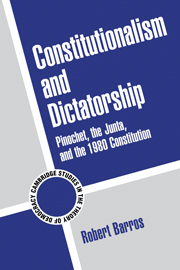Book contents
- Frontmatter
- Contents
- Foreword
- Acknowledgments
- Abbreviations
- Introduction
- 1 Dictatorship, Legality, and Institutional Constraints
- 2 The Constitution of the Exception: Defining the Rules of Military Rule
- 3 The Constitution and the Dictatorship: The Supreme Court and the Constitutionality of Decree-Laws
- 4 The Shadowy Boundary between Force and Law: The Judiciary, Repression, and the Cosmetic Limitation of Emergency Powers
- 5 Constitutionalization without Transition: Prompting the Dual Constitution of 1980
- 6 The Permanent Text: Constitutional Controls or Military Tutelage?
- 7 Even Custom Shoes Bind: Military Rule under the Constitution, 1981–1988
- 8 Military Dictatorship and Constitutionalism in Chile
- References
- Index
Introduction
Published online by Cambridge University Press: 10 December 2009
- Frontmatter
- Contents
- Foreword
- Acknowledgments
- Abbreviations
- Introduction
- 1 Dictatorship, Legality, and Institutional Constraints
- 2 The Constitution of the Exception: Defining the Rules of Military Rule
- 3 The Constitution and the Dictatorship: The Supreme Court and the Constitutionality of Decree-Laws
- 4 The Shadowy Boundary between Force and Law: The Judiciary, Repression, and the Cosmetic Limitation of Emergency Powers
- 5 Constitutionalization without Transition: Prompting the Dual Constitution of 1980
- 6 The Permanent Text: Constitutional Controls or Military Tutelage?
- 7 Even Custom Shoes Bind: Military Rule under the Constitution, 1981–1988
- 8 Military Dictatorship and Constitutionalism in Chile
- References
- Index
Summary
This book is about the military dictatorship that governed Chile for sixteen and a half years from September 11, 1973 through March 11, 1990. It is widely accepted that this was a dictatorship dominated by a single man, General Augusto Pinochet Ugarte, and that the centralization of power in his person explains the exceptional duration of military rule in Chile. This book is also about a central problem within modern political theory: the nature of absolute power and whether rulers who hold such power can effectively constrain themselves with institutions of their own making. Generally, it is believed that such autocratic self-binding is impossible. The reasoning is simple and long-standing: Dictators cannot subject themselves to rules because dictators can always change rules that restrict their power or else violate them without facing sanction. For this reason, effective constitutional limitation of authoritarian power is generally held to be impossible.
This book calls into question both of these established wisdoms. Contrary to the “personalization of power” view, it demonstrates that the course of the dictatorship in Chile was shaped by a collegial military junta. Shortly after the coup, this junta demanded rules to regulate power among the armed forces and later introduced and sustained a constitution which set into operation institutions that limited the dictatorship's power and prevented it from unilaterally determining the outcome of the October 5, 1988 plebiscite which triggered the transition to democracy in 1990.
- Type
- Chapter
- Information
- Constitutionalism and DictatorshipPinochet, the Junta, and the 1980 Constitution, pp. 1 - 9Publisher: Cambridge University PressPrint publication year: 2002
- 1
- Cited by

